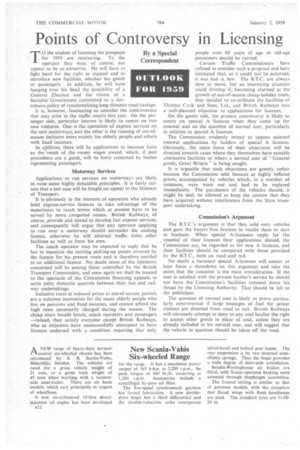Points of Controversy in Licensing
Page 56

If you've noticed an error in this article please click here to report it so we can fix it.
0 the student of licensing the prospects for 1959 are interesting. To the • operator they may, of course, not appear to be so attractive. He will have to fight hard for the right to expand and to introduce new facilities, whether for goods or passengers. In addition, he will have hanging over his head the possibility of a General „Election and the return of a Socialist' Government committed to a doctrinaire policy of renationalizing long-distance road haulage.
It is, however, fascinating to consider the controversies that may arise in the traffic courts this year. On the passenger side, particular interest is likely to centre on two new ventures. One is the operation of express services on the new motorways, and the other is the running of out-ofseason inclusive tours mainly for elderly people and others with fixed incomes.
In addition, there will be applications to increase fares as the result of the recent wages award, which, if past precedents are a guide, will be hotly contested by bodies representing passengers.
Motorway Services
Applications to run services on motorways are likely to raise some highly debatable principles. It is fairly certain that a test case will be fought on appeal to the Minister of Transport. •
It is obviously in the interests of operators who already hold express-service licences to. take advantage of the motorways to reach towns which at present have to be served by more congested routes. British Railways, of course, provide and intend to develop fast express services, and consequently will argue that any operator applying to run over a motorway should surrender his existing licence, otherwise he will abstract traffic from: other facilities as well as from his own.
The coach operator may be expected to reply that he has to maintain the existing picking-up points covered by the licence for his present route and is therefore entitled to an additional licence. No doubt some of the operators concerned will be among those controlled by the British Transport Commission, and once again we shall be treated to the spectacle of the Commission financing appeals to settle petty domestic quarrels between their bus and railway undertakings.
Inclusive tours at reduced prices at out-of-season periods are a welcome innovation for the many elderly people who . live on pensions and fixed incomes, and cannot afford the high rates necessarily charged during the season. The cheap tours benefit hotels, coach operators and passengers —indeed, they satisfy everyone except British Railways, who as objectors have unsuccessfully attempted to have licences endorsed with a condition requiring that only people over 60 years of age or old-age pensioners should be carried.
Certain Traffic Commissioners have refused to consider such a proposal and have intimated that, as it could not be enforced, it was bad in law. The B.T.C. are always slow to move, but an interesting situation could develop if, becoming alarmed at the growth of out-of-season cheap holiday tours, they decided to co-ordinate the facilities of Thomas Cook and Sons, Ltd., and British Railways into a well-planned objection to applications for licences.
On the goods side, the greatest controversy is likely to centre on special A licences when they come up for renewal and on the question of normal user, particularly in relation to special A licences.
The Commission evidently intend to oppose selected renewal applications by holders of special A licences. Obviously, the main force of their objections will be directed towards cases where they themselves have suitable alternative facilities or where a normal user of "General goods, Great Britain" is being sought.
It is arguable that such objections are grossly unfair because the Commission sold licences at highly inflated prices, accompanied by vehicles which, in a number of instances, were worn out and had to be replaced immediately. The purchasers of the vehicles should, it might be •said, be allowed to keep the custom that they . have acquired without interference from the State transport undertaking.
Commission's Argument The B.T.C.'s argument is that they sold only vehicles and gave the buyers free licences to enable them to start in business. When special A-licensees apply for the renewal. of their licences their applications should, the Commission say, be regarded as for new A licences, and their facilities should be compared with those provided by the B.T.C., both on road and rail.
No doubt a harassed special A-licensee will sooner or later force a showdown on this argument and take the point that the customer is the main consideration. If the usenis satisfied with the private haulier's service he should not have the Commission's facilities rammed down his throat by the Licensing Authority. That should be left to the politicians.
The question of normal user is likely to prove particularly controversial if large tonnages of fuel for power stations are diverted from road to rail. British Railways will obviously attempt to deny to any coal haulier the right to accept other goods in place of coal, unless they are already included in his normal user, and will suggest that the vehicle in question should be taken off the road.




































































































